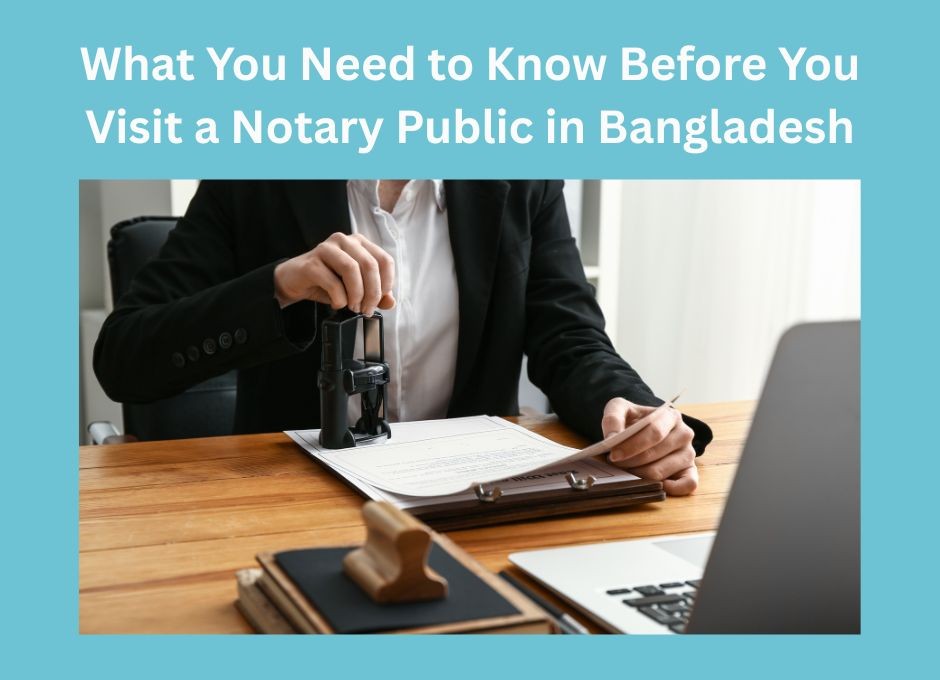When handling legal documents, especially for use in official or international matters, You will need a Notary Public. But what exactly does a Notary do? Why is notarization important in Bangladesh? And how much should you expect to pay? Whether you are an individual handling a legal matter or an expatriate managing affairs from abroad, this article will help you understand the notary process in Bangladesh from legal background to practical tips.
What Is a Notary Public?
A Notary Public is a public officer appointed by the government to carry out certain legal formalities. These include authenticating documents, attesting signatures, preparing affidavits, and ensuring that documents are legally sound and acceptable in courts or foreign embassies. Unlike court proceedings, a notary deals with non-contentious legal tasks. That means their work doesn’t involve disputes—but rather ensures that legal paperwork is handled with formality and accuracy. Many people seek notarial services to strengthen the legal weight of a document or to meet embassy and consular requirements when submitting paperwork abroad.
Legal Basis and Breakdown of Services
In Bangladesh, notarial services are governed by the Notaries Ordinance, 1961. Under this law:
-
The government can appoint both lawyers and qualified individuals to act as Notaries.
-
Each notary must be officially registered and carry out duties under their signature and official seal.
-
They are required to have a professional office to carry out their notarial work.
This legal framework helps ensure that notarial services in Bangladesh are performed in a consistent, standardized, and trustworthy manner.
A Notary Public in Bangladesh performs a variety of tasks under Section 8 of the Ordinance, including:
✔ Verification and attestation of documents such as power of attorney, land deeds, contracts, or affidavits.
✔ Noting dishonoured cheques or bills—important for commercial or banking disputes.
✔ Authenticating foreign documents that need to be recognized by Bangladeshi or international authorities.
✔ Translating and certifying translations for documents submitted to embassies or immigration offices.
✔ Witnessing signatures to confirm legal consent and identity.
✔ Drafting commercial documents like bonds, charter parties, or maritime agreements.
Essentially, if your document needs to be legally binding, trustworthy, or internationally valid, a notary can help you achieve that.
Common Situations When You May Need a Notary in Bangladesh
-
You are buying or selling property and the Sub-Registrar Office requires an attested agreement.
-
You are applying for immigration or visa and need notarized affidavits or translated documents.
-
You are involved in a business deal with a foreign partner and need legal papers authenticated.
-
You want to notarize a divorce declaration, academic certificate, or death certificate for official use.
Notary Fees in Dhaka and Elsewhere: What to Expect
According to government regulations, the official fees are:
-
10 BDT for a basic attestation.
-
25 BDT for affidavits or stamped agreements.
However, these figures reflect the minimum legal fee. In practice—especially in Dhaka Judge Court or other high-volume legal centers—you may pay 500 to 1,000 BDT or more, depending on:
-
The complexity of your case.
-
Whether an advocate is involved in drafting or reviewing your documents.
-
Urgency and number of documents required.
Make sure to discuss the scope of work and fees upfront to avoid surprises.
What to Keep in Mind Before Visiting a Notary
Before heading to a notary, here are a few important tips:
-
Presence is Mandatory: You and any witnesses must be physically present before the notary during the attestation.
-
Bring Proper Identification: Carry your national ID, passport, or other verifiable documents.
-
Double-Check with an Advocate: It’s always safer to consult a lawyer, especially if the document will have long-term legal consequences or is meant for use abroad.
-
Prepare in Advance: Know what type of notarization is required—attestation, affidavit, translation—and have all supporting documents ready.
Doing these things can save time, money, and potential legal issues down the road.
How NRBs and Expats Benefit from Notary Services
If you are a Non-Resident Bangladeshi (NRB) or an expat dealing with legal affairs in Bangladesh, notarization is a key step in everything from property management to visa applications. Notary Public services help validate your documents without requiring your physical presence every time. Many NRBs use notarized Power of Attorney documents to let trusted family members handle transactions in their absence. At times, notarized documents are also a prerequisite for embassies, immigration authorities, or international courts—making them essential for global mobility and legal compliance.
Notarization is more than just stamping a paper—it’s about giving your document legal strength, credibility, and protection. Whether you are finalizing a property deal, submitting documents abroad, or preparing a simple affidavit, having a licensed Notary Public handle the process ensures everything is legally valid.

